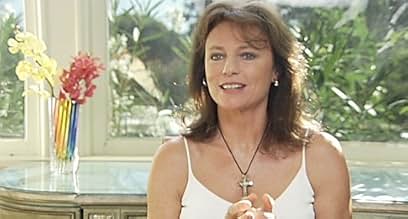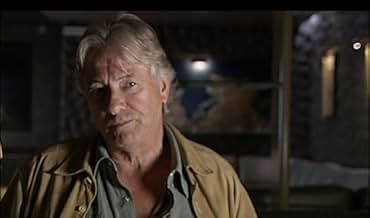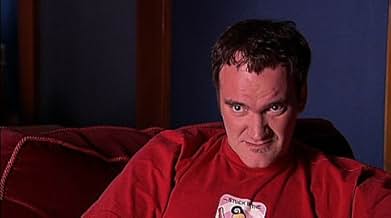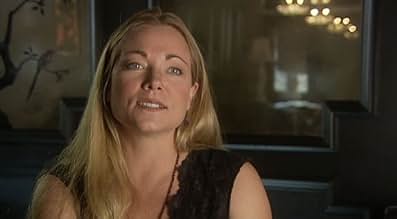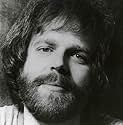अपनी भाषा में प्लॉट जोड़ेंThe story of Z Channel, one of the first U.S. pay cable stations and its programming chief, Jerry Harvey. Debuting in 1974 in LA, their eclectic slate of movies became a prime example of the... सभी पढ़ेंThe story of Z Channel, one of the first U.S. pay cable stations and its programming chief, Jerry Harvey. Debuting in 1974 in LA, their eclectic slate of movies became a prime example of the untapped power of cable television.The story of Z Channel, one of the first U.S. pay cable stations and its programming chief, Jerry Harvey. Debuting in 1974 in LA, their eclectic slate of movies became a prime example of the untapped power of cable television.
- पुरस्कार
- 1 जीत और कुल 1 नामांकन
- Self - Program Director, Z Channel
- (आर्काइव फ़ूटेज)
फ़ीचर्ड समीक्षाएं
The station had among it's subscribers some of the biggest names in Hollywood. What I found fascinating about this film is the power a cable channel can have. For example James Woods credits his Oscar nomination to the Z Channel's constant playing of the little seen movie "Salvador" to the right people.
As a film geek I also enjoyed the generous amount of film clips by director Cassavetes. The film turned me on to movies like "Bad Timing" and "F is for Fake".
For those of you reading this who are not from Los Angeles or are not yet 30, you do not know what you missed. Imagine a late 60's, early 70's FM eclectic station that mixed Marvin Gaye, Frank Zappa, Charlie Parker, Parisian Ballads, The Rolling Stones and Parliment Funkadelic into their play list. Now, imagine the same kind of eclectic mix applied to movies. Oh yeah, add to that some late night Euro soft-core sex movies and a monthly magazine that provided the kind of insight you now find on IMDb with full cast lists and turkey alerts, 20 years before the internet.
The Z Channel got behind previously unheralded directors, actors and screenwriters and presented them to Hollywood power brokers in their Hollywood Hills living rooms. As much as any other factor, Z is responsible for the development of independent cinema in the USA. I know, I know, the Sundance festival is where it broke out. However, the Z Channel took the Raging Bulls of New York and Hollywood, mixed them with the best of world cinema, and presented them all in a single place where all the people responsible for making movies could watch them. Often times before or during their theatrical run! The imaginations ignited.
Nowadays, you have the segregation of radio and movies into distinct market niches (HBO = top 40; Black Starz = R&B; IFC = Alt rock; etc.) Z Channel broke the mold because the rules weren't in place. The credit for this diversity hangs on a cinephile programmer named Jerry Harvey.
And therein lies the tragedy. Much like an artist who borders on madness, Mr. Harvey's demons were almost always with him. The only escape he seemed to find was in a screening room and obsessively chasing down obscure, forgotten, interesting films. He must have been quite a character. Even the people who felt his wrath stand up for him in this film and accept his cruelness for what it was; a mental illness.
That is a long way to get around to an opinion but here goes:
The interviews are great. The film clips are terrific. The story is worth telling to a wider audience. (Though, as much as I would like to believe there is a theatrical market for this film, its subject may be too narrow.)
However, the film is not completely successful merging the parallel stories presented. The first story is the rise and eventual collapse of Z Channel itself. The second is the life of Mr. Harvey and his eventual crimes. The documentary drops hints that the fall of Z Channel parallels the demise of Mr. Harvey. The financial machinations that went on in the boardroom (five owners in ten years) probably had more to do with it than is presented. I suppose it is too much to ask that back room financing be presented as an interesting story arc but there you are.
Overall, the documentary works. The story presented is not one where all the pieces fall into place like a script. Instead it is a Hollywood tragedy played played out with all the blemishes. If it comes your way, do yourself a favor and see what we have lost.
The biographical portions of the documentary -- Harvey's rise from ultra geek to film aficionado, then exhibitor/promoter, all amidst emotional chaos -- are all very interesting, and also tragic. Even more interesting is the history of how The Z Channel was launched, built, ... and eventually lost.
This documentary presents fascinating stories about movies and filmmakers. Michael Cimino's story is a good example. A good friend of Harvey's, Cimino had earned financial support and a free hand by making the incomparable Best Picture, "The Deer Hunter", and then destroyed his credibility & career by his excesses in filming the underrated Heaven's Gate. Through that time, his life was intertwined with Harvey's, presenting unique perspective on the unfolding events.
Harvey not only knew films, and had exceptional taste; he also had the courage and ingenuity to discover and present films (often 'director's cuts) in relentlessly creative, compelling programming. Excellent and important films that have otherwise been overlooked -- like Bertolucci's '1900' and Cimino's Heaven's Gate -- were shown with success by Harvey. One weekend there might be a Truffaut festival, the next perhaps Spaghetti Westerns or the Marx Brothers. Seemingly no genre was ignored; Harvey trusted his audience to watch with open minds and receptive hearts, to respond to great and quirky films, ...and to spread the word and keep the fledgling channel alive and growing. After his death (portrayed compellingly in interviews within the documentary), the station went into decline -- including the desperate step of incongruently showing sporting events (!) in alongside the great film programming. After all, wasn't that part of HBO's success?! Yikes. So sad.
Yet, the greatest joy of this documentary is neither the biography nor the story of Z -- it is the extraordinary range of film clips from the huge range of programming that the Z Channel broadcast.
The visual quality of the documentary is variable, from great to low-grade. But for me, at least, this technical 'weakness' could not undercut a fascinating tour of movies and a devotee who made his taste count. (Indeed, sometimes the "degraded" video imagery was itself a point of interest and beauty.) With apologies to the pretty good Independent Film Channel and the sometimes delightful Turner Classic Movies, the Z Channel appears far better than any station I have seen. I was oblivious to it at the time, so this film was a revelation to me.
James Woods remembers how much he enjoyed working with Oliver Stone on the movie "Salvador" (1986) and he thinks of the role of Richard Boyle, the journalist whose book the films was based on as his best acting achievement. The film was a flop and was pulled from the theaters in two weeks. Jerry Harvey offered to show it on the Z Channel and it ran there for over a month. The next thing, Woods recalls - the movie received two Academy Awards nominations for the Best Actor in a Leading Role for him and for Best Writing, Screenplay Written Directly for the Screen for Stone and Boyle. Woods is sure that it would not have been possible without Z Channel because nobody would see "Salvador".
Thanks to the documentary, I was able to recognize the movie that I saw many years ago in Moscow and still remember well, I could not only recall the title. I remember that the movie was Dutch, very erotic in the raw, brutal, twisted yet beautiful and passionate way. Watching "Z Channel.." last night, I was happy to instantly recognize "Turks fruit" (1973) aka "Turkish Delight" made by Paul Verhoeven in 1973. There are not very many directors in the world that can create the atmosphere of raw sensuality as well as Verhoeven (of his Dutch period, especially). I am going to try to find "Turkish Delight" and see it again.
The film does not hide the dark side of Harvey who with two sisters was raised by the fundamental catholic father in a strict house. One of his sisters has committed suicide and the other vanished (more likely she took her own life, also). Harvey described his childhood as a cross between "American Graffiti" and "Two Lane Blacktop". For many years, Harvey had fought his mental conditions but in the end, he could not cope with the problems, external - pertaining to selling Z Channel to a company that tried to combine films with sports programming and mental that had always been the part of his life. In April 1988 , Harvey shot to death his second wife Deri Rudolf with the gun who was presented to him by his long time friend, Sam Pekinpah. Then, he killed himself.
Controversial and disturbed, fiercely intelligent, madly in love with the films but sadly having lost the battle to the demons of depression, Harvey's will be remembered for bringing to the viewers the films in their "Director's Cut" and the best foreign and independent films.
In the conclusion I want to mention that the movie was made by Alexandra ("Xan") Cassavetes, the daughter of John Cassavetes, the Godfather of American Independent film-making and his muse Gena Rowlands.
क्या आपको पता है
- ट्रिवियाThis film was made only after the financing for another film project, a fiction film, partially collapsed.
- भाव
Alexander Payne: You just never know when you're living in a golden age.
- साउंडट्रैकWhat'll I Do
Performed by William Atherton
Written by Irving Berlin
Courtesy of Paramount Pictures Corporation and Williamson Music
टॉप पसंद
विवरण
- रिलीज़ की तारीख़
- कंट्री ऑफ़ ओरिजिन
- भाषा
- इस रूप में भी जाना जाता है
- Канал Z. Великолепная одержимость
- फ़िल्माने की जगहें
- उत्पादन कंपनियां
- IMDbPro पर और कंपनी क्रेडिट देखें
इस पेज में योगदान दें


